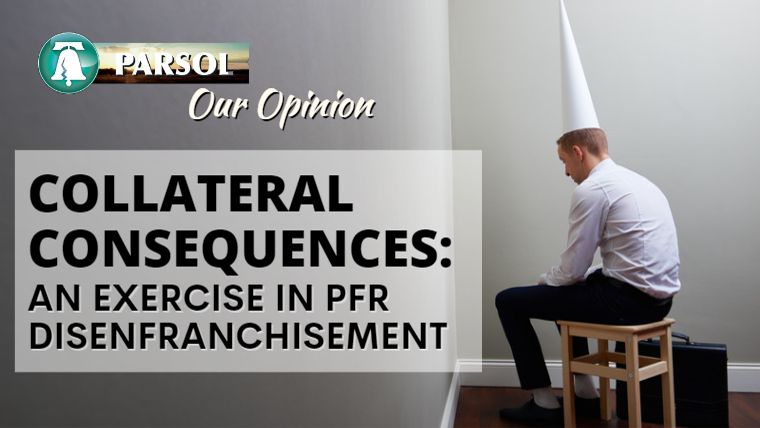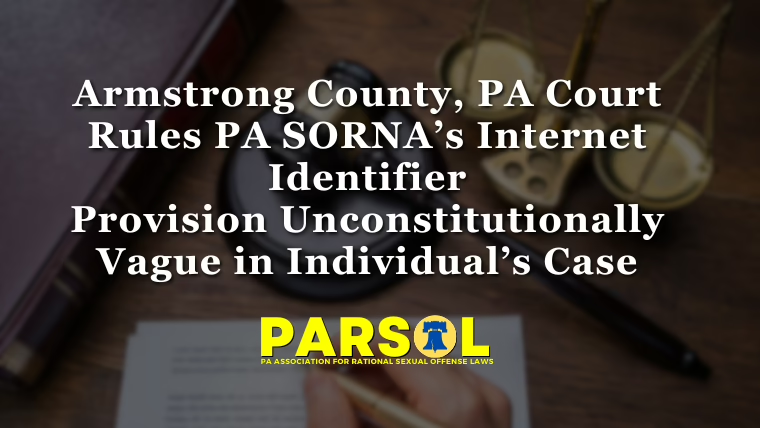I recently penned an essay on felony voting disenfranchisement at the request of an incarcerated friend who needed assistance with a Villanova University application question. As I concluded my composition, I could not help but ponder the countless instances in which PFRs are disenfranchised absent any legitimate government interest or reasonable general risk. As such, the promise of equal protection under the law continues to evade persons convicted of sexual offenses.
In 2008 I was convicted of a sexual offense and sentenced to a 10-20 year prison term. In 2015, while incarcerated in a Pennsylvania state prison, I almost fainted as I carefully read the eligibility requirements for a new program featuring local colleges/universities teaching inmates inside the penitentiary gates. One bullet point among a handful read: Must not be convicted of a sexual offense. My cellmate at the time, serving a life sentence for first-degree murder, was sympathetic to the cause of all incarcerated individuals, not subscribing to the historical inmate notion that PFRs are scumbags unworthy of mercy. Try as we did to discover the rationale behind such an exclusion, our good ol’ college try was futile. Safety and punishment are the only reasons to prohibit an incarcerated individual from attending a program led by civilians, and the fact that a sexual offense was the only classification of crime outright barred from the program should have revealed to any reasonable person that safety was no true concern. Although I was horrified, I was not surprised. You see, this unique and arbitrary disqualification was not without precedent.
During my decade-plus of captivity, I was housed on a long-term honors unit that featured a dog training program. Each of the mere two cellmates I had during my lengthy stay on the unit were dog handlers, so for 10 years I simultaneously had two roommates – one just happened to be a four-legged creature with a bark. The program was an exceptional one, encouraging incarcerated individuals to have empathy and discipline, as well as requiring them to have a significant sense of responsibility. Above all, it gave men locked up in cages like dogs a sense of purpose. The bar was high to qualify as a dog handler (essentially, residence on the coveted honors housing unit qualified one for the voluntary job). But PFRs – many lived on the honors unit – were prohibited from the gig. Why? you ask. After I provocatively applied for the position, was denied, and asked why, the unit manager replied, “Because of the assaultive nature of your crime.” The assaultive nature of my crime? Aside from that characterization being wholly inaccurate, what about 95% of the dog handlers who were lifers, a group who was explicitly encouraged to apply? Does not the crime of a person behind bars serving a life sentence (in Pennsylvania, those convicted of 1st and 2nd degree murder) subsume an “assaultive nature?” What’s more, it is widely known that many individuals who have taken the life of another have had a history of brutality, including, of all things, cruelty against animals. The double-standard and irrationality germane to such a ridiculous rule is laughable. It also is blatantly discriminatory. (And evidence exists that the D.O.C.’s/Canine Partners for Life’s policy is purely arbitrary. While I was rejected from being a dog handler, nothing prohibited me from living with a dog handler. In other words, though I was unable to “publicly” work with a dog, I was permitted to “privately” interact with a dog. This absurd dichotomy demonstrates that prison officials’ and puppy program volunteers’ reservations about PFRs training dogs is a complete façade wrapped up in pure optics.)
The list seems endless. Perpetration of a sexual crime is an absolute non-starter in various contexts – both in and out of prison. Want to extend some compassion to a fellow inmate who has been placed in prison hospice care? Think again if you’re a PFR. Yearning for a visit with your infant or teenaged kids while locked up? Fat chance if your crime was with/against a minor and sexual in nature (unless you can tolerate plexiglass). Pondering a spot on the Community Work Program crew (job detail outside prison gates)? Sexual assault conviction, don’t bother; PFRs are barred. While on parole, individuals with convictions for sexual crimes are subject to mandatory weekly counseling and yearly polygraphs, both financed by their own wallets. And, arguably the most egregious penalty, and certainly the most familiar, persons with sexual offenses must (quarterly, bi-annually, or annually) register their names, addresses, cars, and places of employment (among other personal data in some circumstances) with the state police to appear on a public directory for a minimum of 15 years and a maximum of lifetime.
Marginalizing all criminals or all felons or all parolees from certain rights or activities is suspect enough. But disenfranchising a singular group of offenders in instances where no proven relation exists to the disqualification (or when the risk posed is identical to other, eligible offenders) is at least preposterous and at most unconstitutional. In general, a person with a sexual offense poses more of a danger to an inmate peer in a prison infirmary than does a person with an aggravated assault charge? Really? Those with attempted murder and robbery convictions receive clearances on prison college classes and visits with minors, as well as evade counseling and polygraphs, as if they are less mischievous and deceitful than are those with sexual assault convictions. Seriously?
As wacky as these scenarios sound on their face, the absurdity grows exponentially when discovering that PFRs, among all criminals, boast the lowest rate of recidivism. Journalistic sensationalism is a careless practice that characters like Nancy Grace and John Walsh perpetuate. And because a sexual offense has been the “crime du jour” for nearly two decades now (one could blame its inception on Chris Hansen and his unsophisticated “To Catch a Predator,” which eventually was cut by NBC because of reckless law enforcement tactics), the victims of these dangerous fabrications are persons accused and/or convicted of sexual crimes.
Banning anyone with a felony from voting is an egregious political ploy. Barring PFRs from countless fundamental activities, as well as subjecting them to numerous collateral consequences, is a shameful exercise, not to mention an often-flagrant breach of the U.S. Constitution.
These are the very sorts of laws and policies PARSOL tirelessly works to eliminate.




![stuckIn1995_rally_header - PARSOL - Pennsylvania Assoc for Rational Sex Offense Laws (PA Megan's Law Resources) PARSOL Board Chair Josiah Krammes speaks at the PA Capitol Rotunda flanked by State Reps. Emily Kinkead and Tim Briggs (28 Oct 2025) [John Dawe/PARSOL]](https://parsol.org/wp-content/uploads/2025/10/stuckIn1995_rally_header.avif)